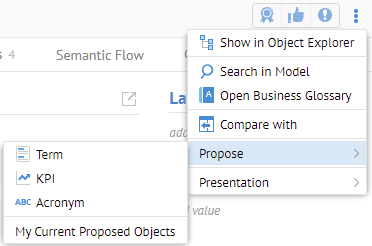Workflow process options
The workflow process applies to all object in a glossary.
When the workflow is enabled, some restrictions apply to the ability to perform certain actions:
-You cannot delete a term that contains published terms
-You cannot publish term until its parent is published (when creating them together).
A status of Workflow Published for a term, means whether the term was ever published, it does not mean it is currently in the Published state. If you create a new term and transition it from Draft → Under Review → Approved, you won’t see the Workflow Publishe” = true.
A simple and complete workflow process with all possible paths is in the diagram below:

The next diagram presents the workflow in a swim lane diagram with the workflow object capabilities/roles required for each workflow state and action.

You can enable the workflow when you create the glossary or after. You cannot disable the workflow after it has been enabled. However, you may change some of the options.
Workflow Action | Workflow object role | |||
Editor | Reviewer | Approver | Publisher | |
Propose Candidate | X | X | X | X |
Create Draft | X | |||
Discard | X | |||
Start Review | X | |||
Mark for Deprecation | X | |||
Submit for Approval | X | |||
Send to Draft | X | |||
Recommend Approval | X | |||
Request Change | X | |||
Reject (Awaiting Approval) | X | |||
Approve | X | |||
Edit (Approved) | X | |||
Publish | X | |||
Deprecate | X | |||
Create, edit or remove attributes and associations | X | X | ||
Create comments | X | X | X | X |
Edit or remove comments | X | X | X | |
Create, edit or remove attachments | X | |||
